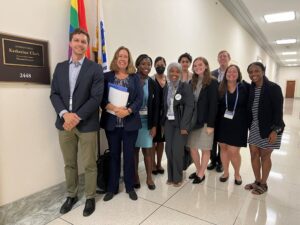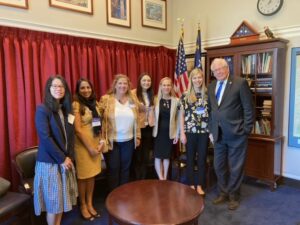
The 10th anniversary of the Rally for Medical Research took place on September 14, 2022. ASHG is proud to have again sponsored this event on Capitol Hill, which brought together 250 participants from more than 30 states and Washington, D.C. to meet with 190 congressional offices. Science advocates were enthusiastic to return to the capital to advocate for robust, sustained, and predictable funding increases for the NIH in fiscal year 2023. The steady increases in NIH funding over the past seven years is not an accident; it is because of advocates sharing their stories that we have seen this growth.
The Rally for Medical Research is an opportunity for the research community to unite, advocate, and celebrate the potential science has to improve human health. At the reception to celebrate medical research preceding the Hill Day, several members of Congress spoke on how funding for the NIH is inherently bipartisan – diseases and conditions affect everyone – and that hope should be available to everyone. Investment in the NIH is not only critical for improving human health, but it also provides a tremendous return on investment and boosts the economy. The speaker line-up also included Mary Woolley, the president and CEO of Research!America, Lawrence Tabak, DDS, PhD, acting director of NIH, and Francis Collins, MD, PhD, the former longtime director of NIH and current science advisor to President Biden. Dr. Collins shared his great enthusiasm for the promise of biomedical research and vision for progress.
ASHG was joined by three members of the Advocacy Certificate for Human Genetics and Genomics Trainees (ACGT) program who spoke with congressional offices about the value of increasing funding to the NIH. Genetic counselor, Sofia Horan, MS, CGC, shared, “Attending the Rally for Medical Research was an energizing experience and being able to participate in-person at Capitol Hill gave me a great appreciation for all the inner workings of what it takes to successfully advocate for policy change,” she said. “We were able to have dynamic conversations with legislative staff about the need for increased NIH funding and how we have all seen that funding help our research and our patients’ lives. It was clear to me that the staff wanted to hear stories directly from us about how policies their office has supported benefit their constituents.” Horan said to see so many people from all different areas of medicine come together to advocate for a common cause was incredible and that she learned so much from the team she advocated with, as well as from the congressional staff. “I plan to use everything I learned at the rally to continue advocating for needed policy change in other areas of genetics so that our patients receive the best care possible,” she said.
Clinical fellow, Kristen Lancaster, MD, added, “I enjoyed meeting other clinicians and researchers from around the country, and hearing how continued, robust NIH funding impacts their work and care for patients. I truly believe we made a difference by meeting with our senators and representatives on Capitol Hill. It was an experience I will never forget!”

ASHG President-Elect, Brendan Lee, MD, PhD, shared, “Federal funding for human genetics and genomics research is enabling new insights into the structure of, and variation in, the human genome and leading to new discoveries in understanding, preventing, and treating disease. Genomic science can improve human health and advance health equity through the deliberate, meaningful inclusion and participation of individuals from diverse groups in research. Sustained funding increases for NIH are critical to ASHG’s mission that people everywhere realize the benefits of human genetics and genomics research.”
This year, the research community is asking that Congress provide at least $49 billion for the NIH base budget, a $4.1 billion increase for FY23, and urges House and Senate leadership to complete work on the FY23 spending bills as quickly as possible to avoid the delays and disruptions caused by continuing resolutions.
How can you get involved? Become an ASHG Advocate; learn more about ASHG’s policy priorities and advocacy activities by visiting our advocacy page. Add your voice and contact your Members of Congress about why robust NIH funding is important to you!
